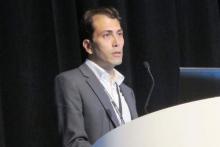DENVER – Once again, angiogenesis inhibitors have been examined for benefit against advanced non–small cell lung cancer (NSCLC) and have been found wanting.
Results of a meta-analysis limited to only phase III randomized controlled trials showed that while angiogenesis inhibitors added to standard of care were associated with modest but significant improvements in progression-free survival (PFS) and response rates (RR), they did not improve overall survival (OS), reported Dr. Jacques Raphael from the Sunnybrook Odette Cancer Centre in Toronto.
“The role of antiangiogenic inhibitors in advanced lung cancer is still questionable,” he said at a world conference on lung cancer sponsored by the International Association for the Study of Lung Cancer.
The findings highlight the need for validated biomarkers that can help clinicians identify which patients are mostly likely to benefit from antiangiogenic therapy, he said.
The investigators conducted a meta-analysis to evaluate the effectiveness of adding any angiogenesis inhibitor or vascular disruptor to standard of care – chemotherapy, tyrosine kinase inhibitors (TKIs), and/or best supportive care – in patients with advanced NSCLC.
Two independent reviewers combed through electronic databases and the websites of international cancer organizations to identify all eligible phase III randomized, controlled trials.
The investigators then performed two separate meta-analyses, each combing data from all other drug trials with data on bevacizumab (Avastin) at either a 7.5-or 15-mg/kg dose.
They identified a total of 25 eligible trials containing data on 19,098 patients, including 9867 treated with an angiogenesis inhibitor and 9231 controls.
For the combined analysis of trials with the 7.5 mg/kg bevacizumab dose, they found no difference in overall survival (hazard ratio, 0.98; 95% confidence interval, 0.96-1.00). Similarly, there was no OS benefit from angiogenesis inhibitors in the analysis including the 15-mg/kg dose of bevacizumab (HR, 0.97; 95% CI, 0.94-1.00).
When they looked at PFS, however, there was a clear benefit in delaying disease progression with angiogenesis inhibitors in both the 7.5 mg/kg bevacizumab analysis (HR, 0.85; 95% CI, 0.79-0.91) and 15 mg/kg analysis (HR 0.85, 95% CI, 0.75-0.88).
Similarly, there was a significant benefit in terms of response rates with the addition of antiangiogenesis in both analyses (odds ratio, 1.61; 95% CI, 1.30-2.01 for the 7.5-mg/kg bevacizumab analysis, and 1.72, 95% CI, 1.39-2.14 for the 15-mg/kg dose).
The investigators also performed subgroup analyses of first-line therapy trials only, trials with monoclonal antibody-based agents, and trials with TKI-based antiangiogenics, and again found PFS and RR benefits, but no OS benefits, Dr. Raphael said.
The failure to see an OS benefit from angiogenesis inhibitors may be attributable to the heterogeneity of drugs in this class (that is, TKIs vs. monoclonal antibodies), clinical trial designs that may have confounded results by allowing crossover to a different drug in later lines of therapy, uncertainties about relative doses of investigational drugs and optimal combinations, and mechanisms of action and resistance.
“Some data show that using antiangiogenic inhibitors can change the microenvironment and even render those agents resistant,” he said.
He noted that there are currently no validated, reliable biomarkers that can aid clinicians in patient selection for antiangiogenic agents.
“This study really confirms a clinical reality that’s known to all of us sitting in the audience,” commented invited discussant Dr. Primo N. Lara Jr. from the University of California Davis Comprehensive Cancer Center in Sacramento.
“The unanswered question is, who actually benefits from bevacizumab? No meta-analysis will answer this question. We would need integrated databases – Big Data – which would include annotated biospecimens to be able to somehow get to this question,” he said.



